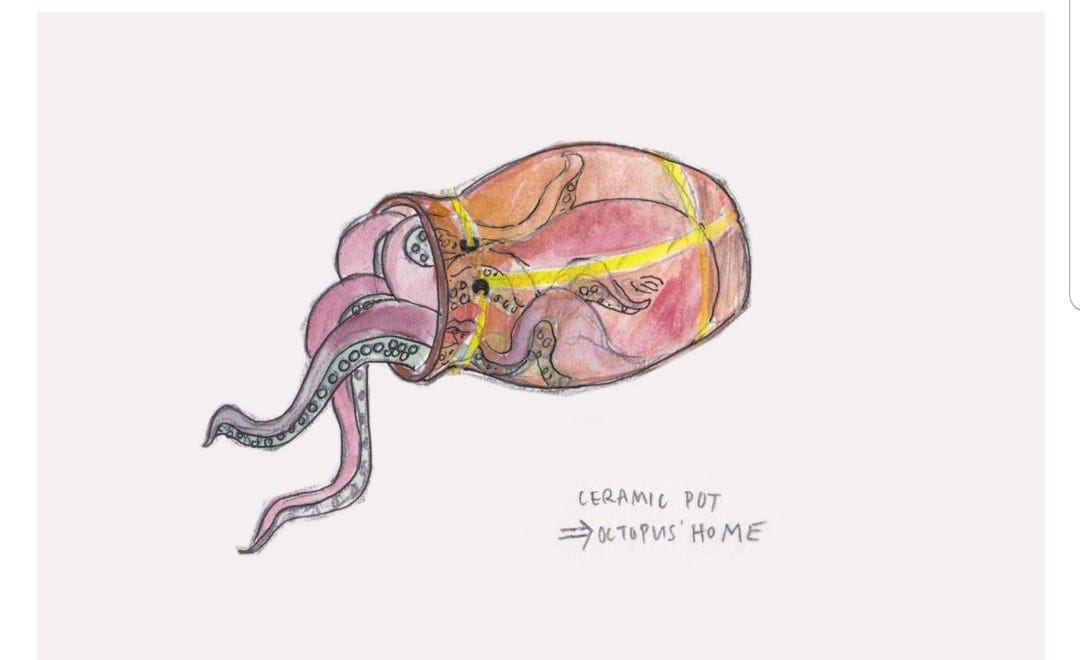The Tell-Tale Takotsubo
Taming the Octopus of Grief
I learned about a new condition today — takotsubo cardiomyopathy, the clinical name for “broken heart syndrome.” I had heard of this physical phenomenon in the context of grief work, and I suspect I have witnessed multiple cases throughout my life — as my losses have been numerous and indelible.
Perhaps, I have even suffered a version of the affliction myself.
It’s a baffling, acute, often difficult-to-diagnose condition, a kind of heart failure associated with an extremely stressful physical or emotional event, such as the death of a loved one, a sudden loss, a traumatic incident, or the end of a romantic relationship, to name a few.
Nan, my dear friend and soul sister of more than half a century, sent me the link this week to a recent TED Radio Hour program on the science of a broken heart. This is the type of material NPR serves up so masterfully — with such gentle compassion and insight, much like my friend Nan. Several of the featured speakers touched my healing heart deeply — from a profoundly caring cardiologist to a wise, emotionally intelligent pediatric ER nurse.
Though I had never heard the term “takotsubo, ”it connected me with Elliot in a heartbeat. He can be so mischievous with his sly, furtive winks, but that’s how I know it’s him – peeking through the murky miasma (another Elliot word) that frequently seems to ooze from my pen.
Takitsudo refers to an ancient container Japanese fishers used to catch octopuses. Apparently, broken heart syndrome causes the left ventricle, the heart’s main pumping chamber, to balloon — resembling the large ceramic fishing vessel with a narrow neck that’s designed to trap an undulating cephalopod. More than 90% of reported cases of takotsubo cardiomyopathy are in women ages 58 to 75[i], but the precise cause is unknown.
Thinking about your heart enlarging to contain a violent surge of emotion is an apt metaphor. Such a sudden and disruptive experience penetrates every cell, muscle, and bone in your body — making your very existence more fragile, like your weakened heart chamber, but also somehow giving you sufficient strength to subdue an agitated octopus of grief. It’s another example of grief’s visceral duality — the sorrow and the love, the agony and the beauty. The curse and the blessing.
Indeed, navigating grief often feels like wrangling the flailing gyrations of an angry octopus in your figurative pot. In one moment, its lashing arms whip past you with random swats, and in the next, they can wrap you in an unexpected embrace like a surprising encounter from “My Octopus Teacher.” In an instant, reaching out for help, then pushing away all who care for you most.
This resonates, because so much of the time, I feel confused about which way is up — just treading water in a vast ocean of disorienting waves, so numerous, overwhelming but often beautiful. I thrash around doing this and that, but alas, I’m still stuck, still questioning everything, still figuring out who I am and what to do.
And like this poignant connection, Elliot’s wisdom typically caught me a little off-guard in life with his rapier precision and exacting truth — such sparkling epiphanies of bittersweet knowing. I can almost imagine how our discussion might go on the history of takotsubo fishing practices, Japanese word origins, the anatomy of the heart, and the irony of the name. He was such a coy and capable etymologist from day one. Born that way, I’d say. Oh, how I yearn to see that sardonically goofy expression he used to make with the purse of his lips and the glint in his eyes.
Takotsudo reminds me of tsundoku — the Japanese word he loved and personified for the habit of collecting too many books to ever read, the word we used to name his memorial fund. And as for the cardiomyopathy part, I suffered an irregular ECG after Elliot’s death. Though the exhaustive tests the cardiologist conducted never produced a clear diagnosis, I do think there is something to the notion of heart damage on the edge of life’s most eviscerating losses — where the emotional and the physical fuse.
And now I realize recognizing this alignment is another powerful step toward finding a way to dance to this new beat and perchance, tame the inner octopus of grief.
P.S. I just walked outside and saw the cracked asymmetrical heart (pictured at the top of the post) on the sidewalk in front of my condo. When you are looking for signs, they often appear. Thanks, Mr. E.
[i] https://www.health.harvard.edu/heart-health/takotsubo-cardiomyopathy-broken-heart-syndrome




Beautiful! I had to visit the heart doctor as well with my daughter died. I wore a heart monitor for three months and same thing; not a definite diagnosis, but definitely irregular heartbeat, and probably a valve issue blah blah blah. Which confirmed yes, my heart was broken. I love the Japanese language as well. This was wonderful.
So grateful to you this morning. ❤️